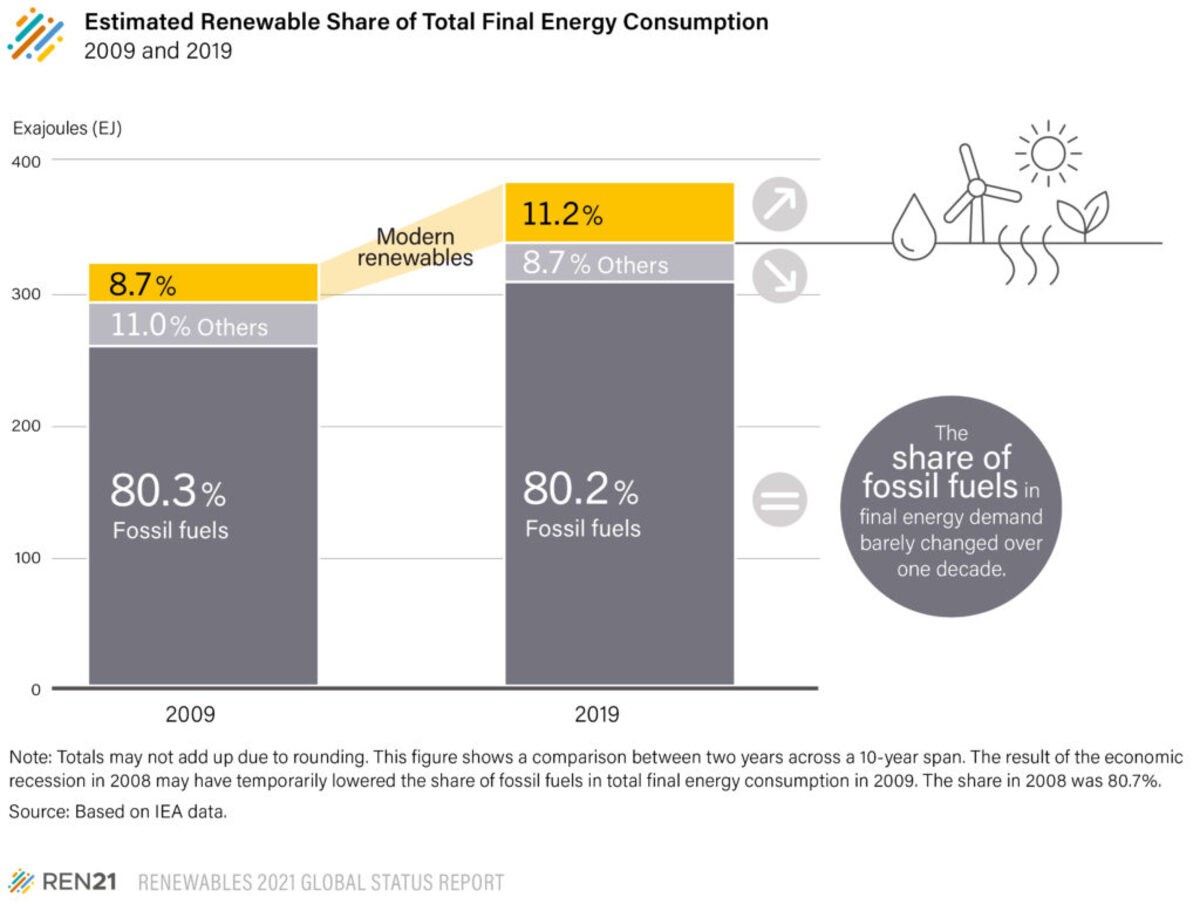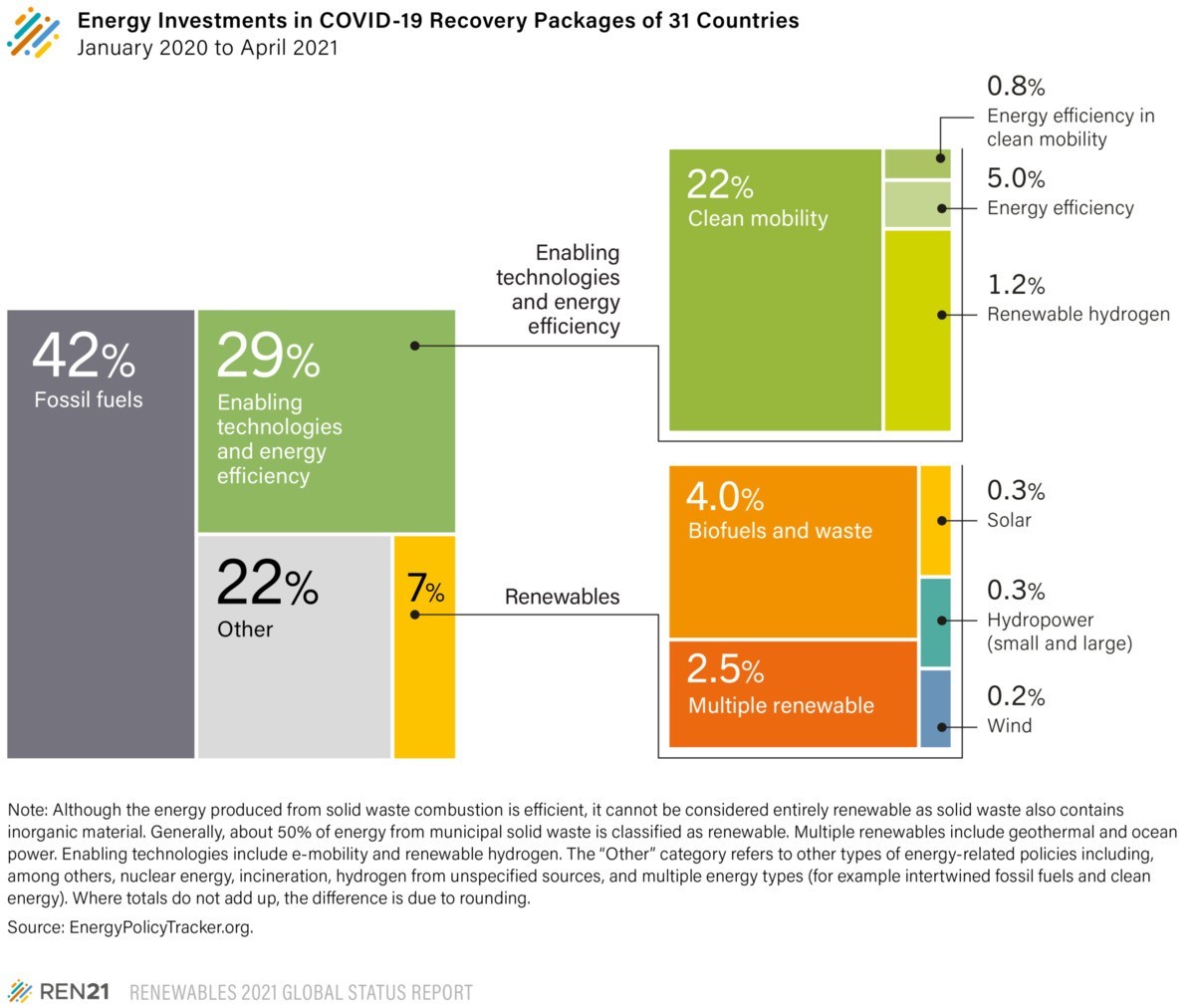Five takeaways from REN21’s Renewables 2021 Global Status Report
REN21 Renewable Energy in Cities

Report shows an alarming gap between targets and actions with fifteen G20 countries lacking a 2020 renewable energy target covering all sectors. REN21 calls for all economic activities to incorporate a key performance indicator to close this gap.
Released on 15 June, the Renewables 2021 Global Status Report compiles developments from the past year on the market, policy and technology trends in renewable energy.
The report’s findings are truly global as they are crowdsourced from hundreds of contributors from industry, NGOs, governments and academia from around the world. Additionally, the chapters go through two rounds of public peer review, leading to the hundreds of acknowledged contributors in the report’s first pages. The robust process of producing the GSR means the findings are deeply relevant for the world. We’ve summarised a few below.
1. While the use of renewable energy has increased, this is overshadowed by fossil fuels remaining a dominant source of energy for the world.
Renewables grew almost 5% per year between 2009 and 2019, outpacing fossil fuels (1.7%). Renewable energy set another record for installed power capacity in 2020, meaning that we now produce around 29% of our energy from renewables.
At the same time, the world is burning more fossil fuels than ever. As seen in the graph below, the share of fossil fuels in the total energy mix is as high as a decade ago and the renewable energy share only increased slightly.
2. Recovery packages pour money into the brown economy despite the advantages of renewables.
The report notes that there has been a wave of stronger commitments to action on the climate crisis in 2020. This includes net zero carbon emissions targets by China, Japan, South Korea and several other regions, countries, cities and companies.
Following announcements of funding for a green economic recovery, taking public spending to levels higher than the Marshall Plan after World War II, 2020 should have been the year when the world pushed the reset button for the global climate economy and renewables.
Instead of driving transformation, recovery packages provide six times more investment to fossil fuels than to renewable energy. As illustrated in the figure below, there was a distinct lack of funding to renewables, despite all the promises made during the Covid-19 crisis.
This year’s report raises a fundamental question: what is holding the world back from using the COVID crisis as an opportunity for transformation? Dr. Stephan Singer, Senior Advisor at CAN International says, “Unfortunately the harsh lesson from the pandemic is that most governments did not use the unique opportunity to further curtail carbon pollution and break the resistance of the fossil fuel incumbents. What counts for them is corporate profit – neither the climate nor people’s health.”
3. For the first time ever, the number of countries with renewable energy support policies did not increase.
Renewable energy targets set the course, but policies are needed to make sure we reach the destination. The targets often aren’t achieved because the prevailing policy frameworks are ineffective. 2020, the year of new norms, highlighted inaction among the world’s policy makers and the lack of concrete measures to decarbonise their economies. The number of countries with policies for renewable energy in transport plateaued in 2017; for heating and cooling the number peaked in the same year and has been declining ever since.
Targets have to be backed up by policies that support the uptake of renewables by incentivising and/or mandating their use. But this is not enough – governments also need to actively phase out the use of fossil fuels and fossil fuel subsidies.
4. Shifting to renewable energy is not only necessary and possible, but it also makes business sense
Fossil fuels are responsible for climate change, and also heavily contribute to biodiversity loss and pollution. Shifting from fossil fuels to renewable energy is a necessary step to take and making renewables the norm is not a question of technology or costs.
The power sector has made great progress already. Today, almost all new power capacity is renewable. More than 256 GW were added globally in 2020 – surpassing the previous record by nearly 30%.
In more and more regions, including parts of China, the EU, India and the United States, it is now cheaper to build new wind or solar PV plants than to operate existing coal-fired power plants.
The business world also is catching on. The amount of renewable electricity from power purchase agreements has grown substantially in recent years, with a record 23.7 GW sourced from corporate PPAs in 2020. This was growth of 18% despite the impacts of the COVID-19 pandemic.
“The renewable energy transition is gaining pace because it makes business sense as well as environmental sense. Renewable electricity is already creating millions of jobs, saving businesses money, and providing energy access to millions. But businesses and governments need to go faster, not only for the environment, but to remain competitive in a renewably powered 21st century economy,” says Sam Kimmins, Head of RE100.
5. The world’s progress towards climate neutrality can be tracked with one simple key performance indicator: renewable energy.
REN21’s 2021 report clearly shows that governments need to give a much harder push to renewables in all sectors. As seen in the figure below, only five of the world’s largest member economies in the G20 – the EU-27, France, Germany, Italy, and the United Kingdom – had set 2020 targets to achieve a certain share of renewables in final energy use.
The window of opportunity is closing unless efforts are significantly ramped up, and it will not be easy to do. Rana Adib, Executive Director at REN21 states:
“Governments must not only support renewables but also rapidly decommission fossil fuel capacity. A good way to accelerate development is to make the uptake of renewable energy a key performance indicator for every economic activity, every budget and every single public purchase. Thus, every ministry should have short-and long-term targets and plans to shift to renewable energy coupled with clear end-dates for fossil fuels.”
Nothing will happen unless we measure the right indicator. Considering the urgency of accelerating the structural shift from fossil fuels to renewables in all societal and economic activities, it is not enough anymore to track renewable energy targets, policies and investment. The world’s progress towards global climate and sustainable development goals can be measured by a simple key performance indicator: the share of renewable energy.
The share of renewable energy reflects developments in energy demand, energy conservation, energy efficiency and emissions in addition to renewable energy uptake and the reduction of fossil fuel use. Reaching a high renewable energy share can be used as the blueprint for a structural shift towards a transformed energy world.
Therefore, this indicator should be integrated at every level of decision making. Because energy is everywhere, the energy transition needs to happen everywhere. This particular key performance indicator lets people measure progress and ensure engagement globally, nationally, in regions, in cities, in any economic sector and even in businesses.
Visit the report page to dive into the online interactive report or download the full report PDF to discover how your sector or area of the world is doing with driving the transition to renewable energy. Keep a copy on hand for when you approach a project, are thinking about policy or need to understand the status of renewables.
Last but not least, this report wouldn’t have been possible without the countless hours from hundreds of people around the world—to all of those who contributed, thank you. Your contribution has helped decision-makers gain a deeper insight of renewables. To all of those who haven’t contributed, sign up to participate in the next report and be part of the renewables revolution.
News published on REN21
Consult the source








